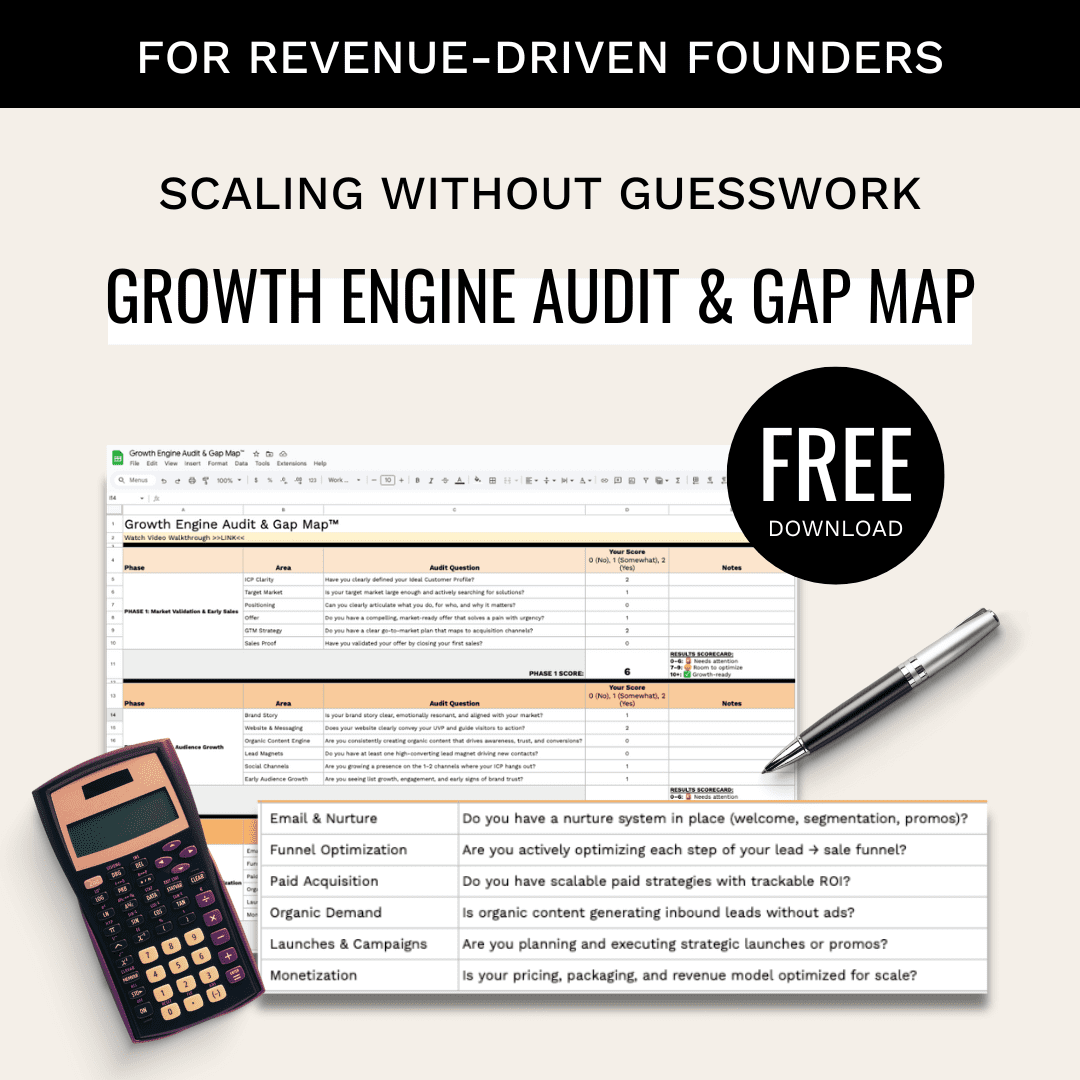AI in marketing isn’t a magic solution, and the hype often overshadows reality. While AI can boost conversion rates by 25% and improve ROI by 22% when used well, many startups rush into adoption without proper planning, wasting resources. Here’s what you need to know:
- Why the Rush? Startups feel pressured by investors, vendors, and FOMO. Companies mentioning "AI" in pitches attract 15–50% more funding, but hasty adoption often leads to regret.
- Overhyped Promises: Claims like "fully automated campaigns", "personalized content at scale", and "accurate predictive lead scoring" are often exaggerated and require human oversight to work effectively.
- What Works: AI excels in competitive intelligence, message testing, and analyzing buyer signals – areas where startups can see real benefits without overcommitting.
- When to Skip AI: Startups in niche, relationship-based, or heavily regulated industries may find AI less effective or risky without proper safeguards.
Quick Takeaway:
AI can deliver results, but it’s not a one-size-fits-all solution. Start small, focus on clear goals, and prioritize tools that solve your specific challenges. Avoid the hype – use AI to amplify human efforts, not replace them.
AI in Marketing: Hype vs. Reality
Why Startups Rush to Adopt AI Marketing Tools
Startups often find themselves swept up in a whirlwind of vendor promises, media buzz, and internal pressure, making it feel almost reckless to say "no" to AI. The combination of exaggerated claims and executive expectations creates an environment where adopting AI marketing tools seems less like a choice and more like a necessity.
The Role of Vendors and Media in Fueling Expectations
AI marketing vendors are known for creating a sense of urgency with lofty claims. Tools that rely on basic algorithms or rule-based automation are frequently labeled as "AI", masking the reality behind flashy buzzwords. Promises like "hyper-personalized customer interactions" or "precise consumer behavior predictions" are common, but many of these tools only provide basic segmentation dressed up as advanced technology.
Media coverage amplifies this hype by highlighting success stories that make AI seem like a magic solution to every marketing challenge. For example, headlines touting Microsoft’s claim that over 85% of Fortune 500 companies use its AI tools or studies showing a $3.70 return for every $1 spent on generative AI create an illusion of inevitability. However, these stories often feature large corporations with extensive resources – robust data systems, dedicated AI teams, and well-defined strategies – that most startups simply don’t have.
This external pressure is compounded by internal executive expectations, pushing startups to make hasty AI investments.
Fear of Missing Out and Internal Pressures
The fear of missing out (FOMO) on AI-driven opportunities is a powerful motivator. Over half (55%) of IT leaders report feeling pressured by executives to implement AI technologies. Adding to this, startups that incorporate "AI" into their branding or strategies tend to attract 15–50% more funding than those that don’t. With 84% of executives believing AI is key to maintaining a competitive edge, the pressure to adopt AI can become overwhelming.
However, this rush often leads to regret. A quarter of IT leaders admit they later regret their AI investments due to a lack of proper planning. Founders, eager to secure funding and meet expectations, may feel compelled to integrate AI even when it doesn’t align with their business goals.
Thomas von der Fuhr, Senior Director & Global Lead of Organizational Performance at Kantar, offers a balanced perspective on this dynamic:
"The brands that are getting it right understand that GenAI is a tool to amplify their marketing efforts, not a substitute for human insight. They invest in building strong foundational skills while embracing AI to streamline processes and uncover new opportunities."
Ironically, while 90% of IT leaders see AI as essential for tackling future challenges, many lack the strategic framework to deploy it effectively. Internal stakeholders, from board members to employees, often expect their companies to be "AI-forward." For startups, admitting they aren’t ready for AI can feel like admitting failure – even when it might be the wisest course of action.
The Most Overhyped AI Marketing Promises
AI marketing tools can offer genuine benefits, but some claims from vendors are far from realistic. Recognizing these exaggerated promises can help startups avoid costly missteps and manage expectations effectively.
Fully Automated Campaign Management
One of the most overstated promises is the idea of complete automation – just upload your campaigns, set some parameters, and let the AI handle the rest while you focus elsewhere. This "hands-off" narrative is a major misconception in AI marketing.
"AI isn’t a ‘set it and forget it’ tool. Regularly assess performance and gather feedback to fine-tune its application. Closely monitor campaign outcomes and use data-driven insights for future improvements."
The truth is that AI magnifies what you feed it. If your strategy has flaws, AI will amplify them quickly. For instance, a poorly targeted PPC campaign can become even more ineffective when AI optimizes it based on incorrect assumptions. Without consistent human oversight and adjustments, AI tools can fall short.
Market conditions and customer preferences change constantly. Automated campaigns left unchecked can become irrelevant, leading to wasted resources. Businesses that succeed with AI – like those reporting a 30% increase in customer engagement and 25% higher conversion rates – invest in thoughtful planning, system integration, and ongoing optimization.
Claims of Personalized Content at Scale
Another overblown promise is the ability of AI tools to produce personalized content for thousands of prospects at once. While 91% of consumers prefer brands offering relevant recommendations, the reality of AI-driven personalization is far more nuanced.
AI lacks the creativity and sensitivity of human insight. Its outputs often rely on rigid templates, leading to content that can feel impersonal or miss important contextual cues. Without careful oversight, AI-generated messages may include factual errors, misinterpret cultural subtleties, or even come across as tone-deaf.
"AI is not wisdom, and content generated solely by AI will lack context and originality… Businesses should use AI as a tool to enhance content creation, not replace real wisdom." – Devesh Dwivedi
Startups, in particular, face hurdles like limited data, smaller budgets, and less AI expertise. While many companies use AI for tasks like grammar checks (42%) or optimizing content (43%), these applications fall short of the sweeping personalization claims made by vendors.
"Original insights that come from reasoning, storytelling and personal experience are the secret sauce that has consistently ranked higher… This is why human-written content will always win!" – Brian David Crane, Spread Great Ideas
The smartest approach blends AI’s efficiency with human creativity. AI can handle tasks like data analysis and draft generation, leaving human writers to inject emotional depth, strategic insights, and brand personality.
Accurate Predictive Lead Scoring
Predictive lead scoring is another area where AI marketing promises often overreach. Vendors claim near-perfect accuracy in identifying which prospects are most likely to convert. While businesses report improvements like a 30% boost in sales efficiency and conversion rate increases of over 50%, these figures don’t tell the whole story.
In reality, 62% of AI sales initiatives fail due to unrealistic expectations and poor preparation. The issue isn’t AI’s potential – it’s the quality and quantity of data available to most startups. Without consistent, clean data from multiple touchpoints, predictive models struggle to deliver meaningful insights.
"The biggest mistake in Predictive Lead Scoring is not a wrong model, but the wrong question. Artificial intelligence cannot tell you which leads will buy – it can only tell you which leads resemble the buyers you have already won." – Dr. Michael Feindt, founder of Blue Yonder
Bias in historical data can further distort results. If your data favors specific demographics or customer types, the AI will reinforce those patterns, potentially overlooking other valuable prospects.
Still, when done right, predictive lead scoring can deliver results. For example, one mid-sized IT service provider reduced their sales workload by 35% and increased qualified opportunities by 27% by focusing on the top 20% of AI-scored leads. Notably, 73% of their new opportunities came from this group – but this success required significant investments in data quality, model refinement, and human oversight.
These cases highlight an important lesson: AI can be a powerful tool, but it works best when paired with human expertise to avoid the pitfalls of overblown expectations.
AI Applications That Actually Work for Startups
AI often gets hyped up with lofty promises, but some applications genuinely deliver results – especially for startups. When used wisely, AI can simplify complex tasks, save time, and produce measurable outcomes without breaking the bank. Below, we’ll explore three key areas where AI shines for startups: competitive intelligence, message testing, and analyzing anonymous buyer signals.
Competitive Intelligence and Market Research
Startups often face an uphill battle against larger competitors with bigger budgets. AI levels the playing field by automating the collection and analysis of competitive data, a process that could take human researchers weeks. Tools like Crayon, Kompyte, SimilarWeb, and SEMrush provide startups with insights into competitors’ digital strategies, from website traffic to SEO performance.
| Tool | Primary Function |
|---|---|
| Crayon | Tracks and analyzes competitors’ digital moves |
| Kompyte | Monitors competitors’ online strategies |
| SimilarWeb | Analyzes website traffic and user behavior |
| SEMrush | Offers SEO and competitor analysis |
AI’s ability to process massive amounts of data quickly gives startups access to insights that were once reserved for companies with dedicated research teams. For instance, Ernst & Young tested an AI-powered tool called Evidenza to replicate a brand survey targeting CEOs of U.S. companies with over $1 billion in revenue. The AI generated over 1,000 synthetic personas and delivered results that were 95% identical to the actual survey. For startups, this means they can validate market assumptions and uncover opportunities without the high costs of traditional market research.
Message Testing and Campaign Optimization
Crafting the perfect marketing message takes time – something startups don’t always have. AI speeds up this process by analyzing performance data in real time, making it easier to test and optimize campaigns. Instead of waiting weeks for A/B testing results, AI tools can pinpoint what resonates with audiences almost instantly.
Companies using AI in marketing report a 30% boost in ROI from advertising campaigns. This is largely due to AI’s ability to analyze customer responses and adjust messaging on the fly. For example, in November 2024, HubSpot’s Breeze AI analyzed past social media performance and industry trends to recommend optimal posting strategies. What once required a team of marketing analysts is now accessible to startups through automation.
AI’s real-time feedback is especially valuable for startups trying to find their product-market fit. By leveraging AI to create targeted buyer personas and test different messages, startups can allocate their limited budgets more effectively. Ad campaigns with automated optimization reduce cost-per-acquisition (CPA) by 30% compared to traditional methods, making AI a game-changer for early-stage businesses.
Anonymous Buyer Signal Analysis
Startups often struggle to identify which prospects are genuinely interested in their products. AI solves this by analyzing anonymous buyer signals – digital breadcrumbs like website behavior and content engagement. These insights reveal buying patterns and help startups focus on leads most likely to convert.
AI-powered tools track how visitors interact with websites, flagging those who match the behavior of past customers. Marketers using predictive models see a 20% revenue increase on average, as they can prioritize resources on high-intent prospects. This is particularly useful for B2B startups with longer sales cycles, where identifying serious buyers early can save time and energy.
AI doesn’t just stop at lead scoring. It also helps startups understand which marketing channels and content formats drive the best results. For example, companies using AI-driven video marketing report a 50% boost in engagement. Combined with buyer signal analysis, these tools allow startups to tailor their content to each stage of the customer journey.
Additionally, AI’s ability to optimize resource allocation can significantly cut costs. McKinsey reports that companies using AI for marketing automation reduce customer acquisition costs by 25%. For startups with limited sales teams, this means focusing efforts on the most promising leads rather than spreading resources too thin.
AI isn’t just a buzzword – it’s a practical tool that can help startups compete, optimize, and grow smarter. From understanding competitors to refining messaging and identifying high-value prospects, these applications demonstrate how AI can make a real difference.
How to Evaluate AI Marketing Tools
Choosing the right AI marketing tool starts with identifying your specific challenges and setting clear goals. Whether you’re tackling lead qualification, content creation, or campaign optimization, knowing your objectives – such as lowering acquisition costs or boosting email open rates – helps you avoid tools that are flashy but miss the mark for your needs.
Recent actions by the Federal Trade Commission (FTC) highlight the importance of being cautious with AI claims. For example, in January 2025, DoNotPay faced a $193,000 settlement after marketing itself as the "world’s first robot lawyer" without thoroughly testing its capabilities or involving legal professionals. That same month, AccessiBe settled for $1 million after falsely claiming its AI could make websites fully accessible within 48 hours.
"AI is a marketing term. Right now it’s a hot one." – Federal Trade Commission (FTC)
These cases emphasize the need for transparency. Insist on understanding how an AI tool operates, not just what it promises. Be wary of vague terms like "AI-powered automation" and ask specific questions: Does the tool use machine learning, natural language processing, or predictive analytics? More importantly, how do these technologies directly address your challenges?
Spotting Red Flags vs Green Flags
To separate hype from substance, compare these red and green flags:
| Criteria | Red Flags | Green Flags |
|---|---|---|
| Sales Approach | Pushes a demo without understanding your needs | Invests time in learning about your challenges before proposing solutions |
| Claims & Promises | Guarantees unrealistic results, like specific lead numbers | Sets realistic, tailored expectations based on your industry |
| Transparency | Offers vague explanations of how the AI works | Provides clear, detailed insights into how the AI makes decisions |
| Integration | Lacks compatibility with your existing tools | Works seamlessly with your CRM, email, and other platforms |
| Pricing | Hidden fees or unclear billing terms | Transparent pricing with options that scale to your needs |
| Proof of Success | No case studies or measurable results | Shares detailed case studies with specific metrics |
| Support & Communication | Slow responses and limited support options | Offers quick, accessible support through multiple channels |
| Customization | One-size-fits-all approach | Provides features tailored to your specific needs |
Beyond these basics, pay close attention to financial terms and data security. The FTC’s case against eCommerce Empire Builders in September 2024 revealed $14.3 million in consumer losses due to exaggerated claims about AI-powered e-commerce stores. Many buyers saw no return on investment and little AI support. Carefully review contracts, including cancellation terms and dispute resolution processes.
Data security is equally critical. Ensure the tool complies with regulations like GDPR and provides clear details on how it handles customer data. Ask about encryption, storage locations, and whether you retain data ownership if you stop using the service.
The best AI tools should grow with your business. Cassie Pless, VP of Sales at Lexion, explains their approach:
"One of the reasons that Lexion runs weekly, live demos on LinkedIn is because we want anyone interested in our AI-powered CLM tool to have access. That said, our 1-on-1 demos are where we take the time to map out exactly how our product meets the objectives and needs of a specific organization."
This kind of personalized approach reflects a vendor that understands the unique needs of each business. Look for tools that can scale with your operations, handle larger data volumes, and manage increasing complexity without driving up costs or causing disruptions.
Finally, prioritize vendors that integrate smoothly with your existing systems and offer a phased rollout. A good AI tool should connect effortlessly with your CRM, analytics tools, and other platforms. Starting with a small pilot program can help demonstrate value before committing to a full-scale implementation. Tools that work in isolation risk creating data silos, which can limit your ability to track and improve marketing performance effectively. Reputable vendors will encourage this step-by-step approach to ensure their solution meets your needs.
sbb-itb-e8c8399
3-Phase AI Adoption Plan for Startups
Adopting AI isn’t about diving in headfirst – it’s about taking a measured, step-by-step approach that aligns with your business goals and budget. Max Belov, CTO at Coherent Solutions, captures this perfectly:
"Establish realistic goals and evaluate how AI supports your business objectives."
A February 2025 study of 50 startups found that 82% faced high implementation costs, and 76% struggled due to a lack of AI expertise. However, startups that succeeded followed a structured three-phase plan, minimizing risks while gaining valuable insights.
Phase 1: Research and Planning
This first phase is all about laying the groundwork. Before automating anything, you need to understand your market and content landscape. Start by defining your business objectives and running a cost-benefit analysis. Skipping this step often leads to wasted money on tools that don’t deliver.
In this stage, focus on using AI for competitive intelligence and market research. For instance, AI tools can help you analyze competitors’ strategies, track pricing trends, and uncover market gaps – offering insights comparable to those from a full-time analyst, but at a much lower cost.
Data collection and analysis are key here. Import your initial data into analytics tools, look for patterns that could guide your marketing strategy, and address any data quality issues. The goal is to have clean, organized data and a clear understanding of how AI can help tackle your marketing challenges. This sets the stage for introducing semi-automated solutions in the next phase.
Phase 2: Partial Automation
Once you’ve built a strong data foundation, it’s time to experiment with semi-automated tasks that still involve human oversight. Start small with manageable projects like dynamic email campaigns or A/B testing ad variations. These are easy to track, and if something goes wrong, you can quickly adjust.
At this stage, focus on integrating data from your CRM, email platforms, and analytics tools to create a unified view of your customer base. Custom APIs and middleware often play a crucial role in connecting your existing systems with AI tools. The smoother these integrations, the better your AI systems will perform.
Since 76% of startups report struggling with a lack of AI expertise, invest in team training to build basic AI knowledge. Once your pilot projects start showing measurable results, you’ll be ready to move into the final phase.
Phase 3: Performance Optimization
In this advanced stage, the focus shifts from basic automation to fine-tuning and optimizing performance. AI becomes a tool for developing predictive models, refining test designs, and identifying the most effective strategies. Scaling these efforts requires solid infrastructure, strong data management practices, and clear protocols for managing changes.
Take, for example, a retail company that begins by using AI for inventory management. Over time, they might expand its use to customer service and marketing. At this stage, you’ll evaluate AI performance against specific benchmarks and refine your models based on real-world results. This might involve splitting data into training, testing, and validation sets to ensure continuous improvement. Ongoing monitoring is critical to catch and fix issues before they disrupt your operations.
Businesses often revisit earlier phases as they grow or face new challenges. Revisiting isn’t a sign of failure – it’s part of adapting to changing needs and exploring new opportunities.
When Startups Should Skip AI Marketing
AI marketing might be the buzzword of the moment, but it’s not a one-size-fits-all solution. For some startups, adopting AI-driven strategies can lead to wasted resources and misaligned priorities. In fact, up to 60% of marketing budgets are already wasted, and layering AI onto an incompatible model can make those inefficiencies even worse.
Technical or Niche Audiences
When it comes to industries requiring deep expertise or specialized insights, AI often struggles to deliver. In technical fields, where accuracy and precision are non-negotiable, AI’s limitations become glaring.
Take the transcription industry as an example. Here, a nuanced understanding of context is critical. Ben Walker, CEO of Ditto Transcripts, underscores this issue:
"A trained human can easily differentiate between ‘hyper’ and ‘hypo.’ Those prefixes have opposite meanings, but people’s accents, speech patterns and the audio recording quality can confuse AI systems."
This challenge isn’t unique to transcription. The global marketing transcription market, projected to hit $4.4 billion by 2033, highlights the growing demand for accuracy in specialized fields. For startups targeting technical audiences – like advanced tech sectors or scientific communities – AI-generated content often falls short. These audiences expect detailed case studies and insights that demonstrate a deep understanding of their unique challenges, not generic content that misses the mark.
Similarly, industries built on personal connections face hurdles when relying too heavily on AI.
Relationship-Based Sales Processes
Startups operating in sectors that thrive on long-term relationships may find AI less effective. Industries like traditional B2B sales, consulting, and other service-based models often depend on interpersonal connections rather than just transaction data.
For example, enterprise software sales or high-value consulting deals often involve multiple stakeholders, extended decision-making processes, and a need for nuanced conversations. In these cases, personal engagement trumps automation. Diverting resources to AI marketing tools could take away from efforts that genuinely build trust and connections. And trust matters – companies with strong marketing strategies are 13 times more likely to see positive ROI.
Heavily Regulated Industries
Startups in regulated industries face another layer of complexity when it comes to AI marketing. Healthcare, finance, aviation, and pharmaceuticals, for instance, must navigate tight compliance requirements and evolving regulations.
The risks are real. Privacy laws often lag behind the capabilities of AI, leaving gaps in compliance when it comes to data processing or potential biases. Security vulnerabilities and a lack of transparency in AI algorithms can also pose significant challenges, especially in proving compliance with promotional review standards.
Yves Remmler, Founder & CEO of Endeavor Elements, Inc., emphasizes the importance of balance:
"AI is not a replacement for human expertise – it’s a tool that, when used effectively, can transform how highly regulated industries operate."
Ralf Lindenlaub, Chief Solutions Officer at Sify Technologies, adds another cautionary note:
"AI outputs can appear confident but be entirely false, biased, or even privacy-violating. Enterprises often underestimate how damaging a flawed result can be, from discriminatory hiring to incorrect legal or financial advice. Without rigorous validation and human oversight, these risks become operational liabilities."
For startups in these industries, implementing AI marketing tools without strict compliance measures and human oversight can lead to regulatory violations or reputational damage. In such cases, the risks often outweigh the potential benefits.
The takeaway? AI works best when its strengths align with your business model, audience, and industry constraints. Blind adoption isn’t the answer – strategic application is.
Conclusion: Using AI Marketing Tools the Right Way
After considering the practical benefits and limitations of AI, one thing is clear: success depends on how strategically you use it.
AI in marketing isn’t overhyped when applied thoughtfully. The challenge lies not in the technology itself but in how startups implement it. According to McKinsey’s 2024 State of AI report, 72% of companies are now leveraging AI in at least one area of their business. The most successful ones treat AI as a tool to accelerate growth, not as a magic wand.
Startups that succeed with AI often follow a straightforward approach. They start by pinpointing specific bottlenecks in their marketing process, then choose AI tools that are cost-effective, user-friendly, and deliver proven results. Take BrewBold, for example. Struggling with stagnant TikTok growth – just 1,000 followers and 2% engagement – they turned to ChatGPT to create 30 video scripts centered on "coffee hacks" and used Canva Magic Design for thumbnails. With AI-identified hashtags, one post reached 2 million views, bringing in 18,000 new followers in just two weeks. This kind of success highlights the power of tailoring AI solutions to your startup’s unique challenges.
The numbers back this up. Marketers using AI tools report a 6.2% increase in sales, a 7% improvement in customer satisfaction, and a 7.2% reduction in marketing costs. Start small with rule-based tools, then scale up to more advanced machine learning applications. Look for AI solutions that integrate easily with your existing tech stack through open APIs and ensure human oversight by setting clear boundaries for AI outputs.
Data quality is another critical factor. Regularly audit your data sources, align data collection with your business goals, and prioritize privacy-compliant practices. The key is finding a balance: let AI handle repetitive tasks and data analysis while humans focus on strategy and creativity. Companies that achieve this balance report campaigns with 2.5× higher engagement and follower growth that’s 3× faster. Striking this balance is what drives results.
AI marketing tools shine brightest when they solve real problems tailored to your audience and growth stage. Forget the hype; focus on practical, grounded applications. At the end of the day, the goal is simple: use AI to amplify human insight, not replace it.
FAQs
How can startups align AI adoption with their unique goals and challenges?
How Startups Can Align AI Adoption with Their Goals
To make the most of AI, startups should focus on how it can tackle specific challenges and fit seamlessly into their broader strategy. The first step? Clearly define your business objectives. Once you’ve done that, pinpoint areas where AI can deliver measurable benefits – like automating tedious tasks, enhancing customer personalization, or diving into data to inform smarter decisions.
One key thing to keep in mind is setting realistic expectations. AI isn’t a magic wand that solves everything; it’s a tool designed to complement your marketing efforts. When evaluating AI tools, look for ones that address your unique needs and work well with your current workflows. Think of AI as an accelerator, not a replacement. By using it to boost, rather than overhaul, your operations, startups can harness AI to drive growth while staying true to their core objectives.
What are the risks of using AI in marketing for startups, and how can they avoid them?
Using AI in marketing opens up new possibilities, but startups need to tread carefully to avoid common pitfalls. One major risk is falling for overblown promises, like "set-it-and-forget-it" systems, which often fail to deliver on their lofty claims. There’s also the issue of ethics – missteps like violating data privacy or relying on biased algorithms can erode customer trust and even lead to legal trouble.
To steer clear of these challenges, set realistic goals for what AI can achieve and treat it as a tool to complement – not replace – your overall marketing strategy. Prioritize ethical data practices by creating clear guidelines and performing regular audits to catch and fix any biases in your AI systems. Most importantly, keep human oversight at the heart of your decision-making process. This ensures AI works to support your objectives while maintaining accountability and integrity.
When should a startup avoid using AI in their marketing strategy?
When Startups Should Avoid AI in Marketing
Startups might want to think twice about using AI in their marketing strategy under certain circumstances. For instance, if they don’t have access to reliable, high-quality data, AI tools can end up producing inaccurate insights. This not only wastes time but can also drain resources without delivering real value. Similarly, if the marketing plan is still in its infancy or lacks clear, measurable goals, adding AI into the mix might complicate things rather than help.
Another red flag? Overhyped promises from AI vendors. Tools that claim to deliver instant results or offer "set-it-and-forget-it" automation often fall short. Relying on such tools can lead to financial losses and unmet expectations. The truth is, AI works best when it supports a well-thought-out marketing strategy – it’s not a substitute for building a strong foundation.
Related Blog Posts
- AI Agents in Marketing: The Secret to Driving 10x Engagement & Conversions
- 5 Ways AI Can Optimize Marketing ROI for your Tech Startup
- AI Lead Scoring: Basics for B2B Marketing
- AI Growth Marketing: Forecasting Use Cases




